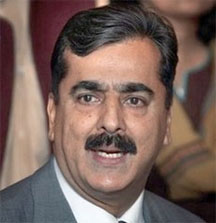ISLAMABAD (Reuters) – Pakistan’s prime minister ruled out “business as usual” with the United States yesterday after a NATO attack killed 24 Pakistani soldiers and the army threatened to curtail cooperation over the war in Afghanistan.
Saturday’s incident on Pakistan’s border with Afgha-nistan has complicated US attempts to ease a crisis in relations with Islamabad and stabilize the region before foreign combat troops leave Afghanistan.
“Business as usual will not be there,” Prime Minister Yusuf Raza Gilani told CNN when asked if ties with the United States would continue. “We have to have something bigger so as to satisfy my nation.”

While the NATO strike has shifted attention from what critics say is Islamabad’s failure to go after militants, Gilani’s comments reflect the fury of Pakistan’s government and military – and the pressure they face from their own people.
“You cannot win any war without the support of the masses,” Gilani said. “We need the people with us.”
The relationship, he said, would continue only if based on “mutual respect and mutual interest.” Asked if Pakistan was receiving that respect, Gilani replied: “At the moment, not.”
Gilani’s comments cap a day of growing pressure from the Pakistani military, which threatened to reduce cooperation on peace efforts in Afghanistan.
“This could have serious consequences in the level and extent of our cooperation,” military spokesman Major General Athar Abbas told Reuters.
Pakistan has a long history of ties to militant groups in Afghanistan so it is uniquely positioned to help bring about a peace settlement, a top foreign policy and security goal for the Obama administration.
Washington believes Isla-mabad can play a critical role in efforts to pacify Afgha-nistan before all NATO combat troops pull out in 2014 and it cannot afford to alienate its ally.
US national security officials met at the White House yesterday to discuss Pakistan following the weekend incident, which prompted Pakis-tan to shut down NATO supply routes into Afghanistan in retaliation and which was the worst of its kind since Islamabad allied itself with Washington in 2001.
“We have been here before. But this time it’s much more serious,” said Farzana Sheikh, associate fellow of the Asia program at Chatham House in London.
“The government has taken a very stern view. It’s not quite clear at this stage what more Pakistani authorities can do, apart from suspending supplies to NATO forces in Afghanistan.”
The weekend attack was the latest perceived provocation by the United States, which infuriated and embarrassed Pakistan’s powerful military in May with a unilateral special forces raid that killed al Qaeda leader Osama bin Laden.
Adding a new element to tensions and giving a diplomatic boost to Islamabad, China said it was “deeply shocked” by the incident and expressed “strong concern for the victims and profound condolences for Pakistan.”
Russia, seeking warmer relations with Pakistan as worry grows over the NATO troop pullout in Afghanistan, said it was “unacceptable” to violate the sovereignty of states even when hunting “terrorists.”
US State Department spokesman Mark Toner said Pakistan was rethinking whether to attend next week’s conference on Afghanistan in Bonn, Germany, although Washington had not yet received any definitive decision from the Pakistanis.
“We understand that they are reconsidering,” Toner told reporters. “We hope that they do in fact attend this conference because this is a conference about … building a more stable and prosperous and peaceful Afghanistan and so that is very much in the interests of Pakistan.”
On Saturday, NATO helicopters and fighter jets attacked two military outposts in northwest Pakistan, killing the 24 soldiers and wounding 13, the army said.
NATO described the killings as a “tragic, unintended incident.” US officials say a NATO investigation and a separate American one will seek to determine what happened. The US investigation will provide initial findings by December 23, military officials said.
“It is very much in America’s national security interest to maintain a cooperative relationship with Pakistan because we have shared interests in the fight against terrorism, and so we will continue to work on that relationship,” White House spokesman Jay Carney told reporters.
A Western official and an Afghan security official who requested anonymity said NATO troops were responding to fire from across the border at the time of the incident.
Pakistan’s military denied NATO forces had come under fire before launching the attack, saying the strike was unprovoked and reserving the right to retaliate.
